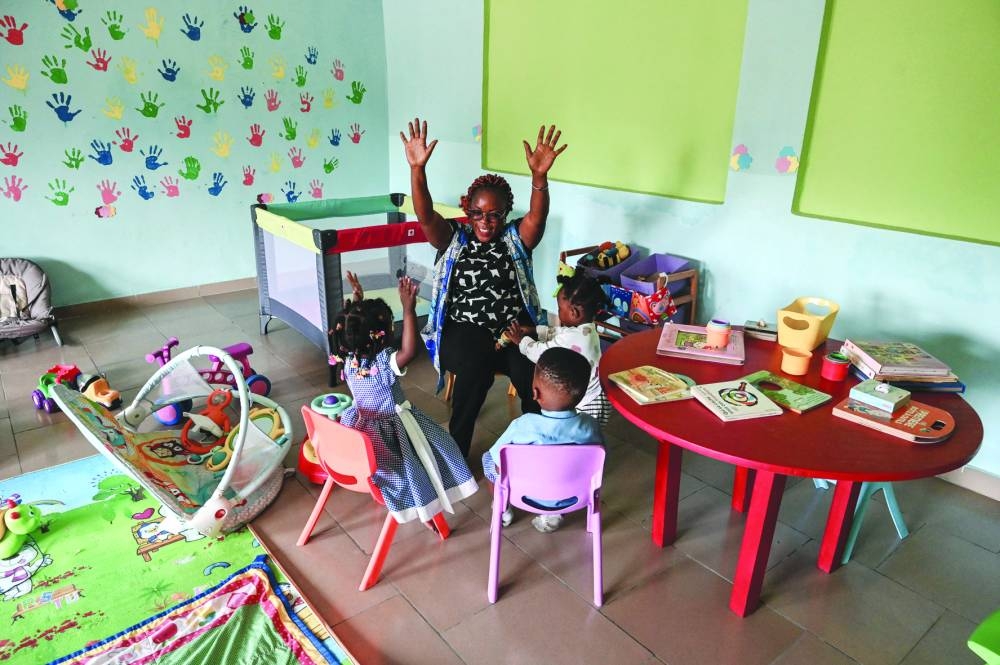Creches and nurseries are springing up in Ivory Coast, marking a break from tradition for those who can afford it, as women increasingly go out to work.
Even if the number of establishments is still low in relation to the West African country’s four million pre-schoolers, the provision has shot up recently.
There are now 254 private creches and nurseries across Ivory Coast — more than 200 in the economic hub, Abidjan, alone - compared to 174 last year, according to the women, family and children’s ministry.
That’s on top of nearly 300, and counting, state-run establishments.
“It allows you to breathe,” said Chimene Guissou, 31, dropping off her daughter at the Baby Joy nursery in Abidjan’s trendy Cocody neighbourhood.
Guissou stopped working when Neriah was born two years ago. But now, she takes advantage of the few hours her daughter is at the nursery to look for a new job.
Mum of two and lawyer Fatoumata Bamba said creche offered “an educational setting” for her daughter and allowed her to be “more peaceful and productive at work”.
Johana Yoboue, who manages Baby Joy which opened in 2018, said that the creche provided “relief” for women.
“It allows them to go about their business, to be much more fulfilled in their work, to be much more relieved on a physical and emotional level too,” she said.
The boom comes as the number of Ivorian women in the job market is also on the rise - 51% were actively seeking employment in 2022, compared to 46% the previous year, the latest official data showed.
The vast majority work in the informal sector but more and more women are employed in salaried professions and, according to the government, they are increasingly holding leading positions in the economy.
Businesses owned by women jumped by a quarter in five years and account for more than 20% of formal enterprises, figures from late 2022 showed.
Women also head more than one in three small and medium-size businesses.
BENEFITS OF SOCIALISING
Ivorian children are traditionally looked after by a childminder at home or another family member if their parents can’t care for them before they begin school at the age of six.
Salimata Bambara, who manages the newly opened Sally Kids Care private creche in the popular Yopougon neighbourhood, said some people preferred a childminder who could also do housework but that the children ended up “suffering”.
For his three-year-old son Hazaria, Pierre Desire Boga has switched from a childminder to the Baby Joy nursery.
In a sandpit filled with building blocks and other toys in its brightly coloured courtyard, the smallest children babble away, while the older ones are beginning to talk.
“At least here he can be around other children” and learn to read, write or even speak other languages, Boga said.
NEED FOR TRAINED STAFF
The growing demand for structured pre-school care has shone a light on the need for specialised staff.
Ivory Coast has a few state-run early-years training colleges, as well as a handful of private ones, including the Training School for Early Childhood Careers in Abidjan.
It opened in 2019 and turns out about 100 qualified graduates every year.
“We saw that creches and nurseries lacked staff and that the staff had no qualification,” head of training Omer Boua Boidi said.
He said the school had looked to its peers abroad when drawing up the curriculum, which includes studying psychology, nutrition and autism.
However, as in countries around the world, childcare costs remain a hurdle for many families.
Annual fees for a creche place can be as much as one million CFA francs ($1,670) - more than the minimum wage for a whole year.
But for those working at Abidjan’s busy Cocovico market, a modest but affordable option is available.
Three years ago, the market’s management opened a nursery for the children of stallholders and locals.
It “helps women to be more autonomous”, manager Lucie Djama said.
To register for a place costs 25,000 CFA francs ($42), with monthly fees at 7,000 CFA francs, but the price can always be negotiated depending on the household’s income.
For popcorn seller and mother Adele Kouabenan, the nursery is a godsend. Before, she used to have to carry her now three-year-old son around on her back while she worked.
Now, “I can move as I want, sell as I want,” she said.

A pre-school teacher plays with children in the nursery of the Papyrus school group in the popular commune of Yopougon in Abidjan.
